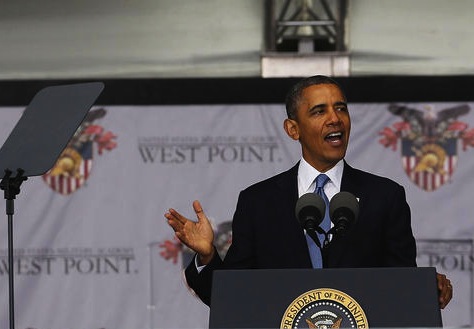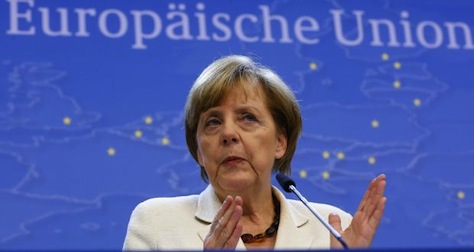Foreign policy analysts are fawning over US president Barack Obama’s commencement address today at West Point, many of whom argue that it marks the most definitive summary of the ‘Obama doctrine,’ whatever that may be, of his second term — and maybe even his entire administration.![]()
Max Fisher at Vox proclaimed it one of the most anti-war doctrines in US history in decades. I don’t mean to focus on Fisher in particular but is that really true?
Obama outlined many of the themes that have long marked his approach to foreign policy:
“America must always lead on the world stage,” he said. “But U.S. military action cannot be the only – or even primary – component of our leadership in every instance. Just because we have the best hammer does not mean that every problem is a nail.” Under pressure from critics who say the United States has been rudderless amid a cascade of crises, the president said that those who “suggest that America is in decline, or has seen its global leadership slip away – are either misreading history or engaged in partisan politics.”
Obama also announced a new $5 billion fund designed to help allies in the Middle East and Africa fight radical terrorists, and he pointed to the ways in which the United States can assist countries deal with the burdens of the influx of refugees in countries like Lebanon and Iraq. He defended the notion that the United States could provide a constructive role in solving some of the world’s most vexing international hot spots without necessarily committing to military force — including Syria’s ongoing civil war and Ukraine’s recent turmoil.
Despite the polished address, The New York Times reports a clearer version of Obama’s vision on the basis of private conversations and previous addresses:
On a trip to Asia last month, Mr. Obama described his foreign policy credo with a baseball analogy: “You hit singles, you hit doubles; every once in a while we may be able to hit a home run.” But, he added, the overriding objective is to avoid an error on the order of the Iraq war. In private conversations, the president has used a saltier variation of the phrase, “don’t do stupid stuff” – brushing aside as reckless those who say the United States should consider enforcing a no-fly zone in Syria or supplying arms to Ukrainian troops.
There’s already a name for what Obama has described: realism, or if you like, neorealism. And it’s nothing new. It’s been a pillar of mainstream US foreign policy since at least World War II. You could easily imagine the same themes from Obama’s speech today in any speech from just about any US president, Republican or Democratic, in the last seven decades. Continue reading Obama doctrine: ‘Don’t do stupid stuff.’ Or, as we call it, ‘realism.’

